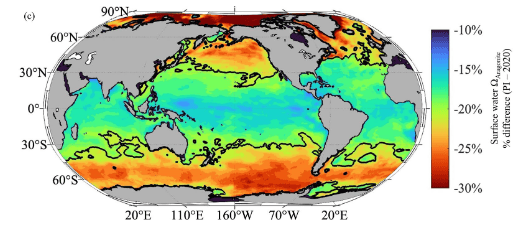
According to a study by ocean scientists from the UK, USA and Europe, more than 40% of the surface of the world’s oceans have already exceeded the maximum permissible level of acidification.
The ocean is known to absorb about a third of CO2 from the atmosphere that gets there as a result of humanity’s burning of fossil fuels. Ocean absorption of carbon emissions slows down the temperature rise in the atmosphere, but leads to acidification of seawater.
Dissolving in seawater, CO2 forms carbonic acid. This leads to lower pH levels and reduces the available carbonate ions for marine life. These ions play a key role for creatures such as corals, sea sponges, oysters, and tiny swimming snails because their shells and skeletons are made of calcium carbonate. To track this process, scientists use the indicator Ω_arag — aragonite saturation.
In 2009, scientists proposed a planetary limit to ocean acidification at an average Ω_arag of less than 20% compared to pre-industrial levels. This limit has now been largely crossed. The scientists in the new study analyzed both the surface and deeper layers of seawater. They found that as of 2020, more than 40% of the world’s ocean surface is acidified by more than 20%. At the same time the subsurface layer — up to 200 meters, where many marine species live and feed — has crossed this boundary on 60% of its own area.

The process of acidification is not uniform. Acidification is most active in cold waters, where CO2 dissolves more easily. Acidification destroys the building blocks of coral reefs. Other species under threat are oysters, mussels, and gastropods. Researchers are already finding marine life with characteristic damage to their shells.
Currently, the best way to combat further ocean acidification is to reduce greenhouse gas emissions. However, we need to act quickly and quite radically. The loss of the world’s oceans will be a catastrophe not only for marine life, but also for humanity, as they feed billions of people around the world. In addition, the ocean contains about half of all oxygen is produced the air we breathe.
60% of the world’s oceans turned out to be a farm of huge shrimps — but they are hard to reach
The results of the study are published in the journal Global Change Biology
Source: ZMEScience

Spelling error report
The following text will be sent to our editors: